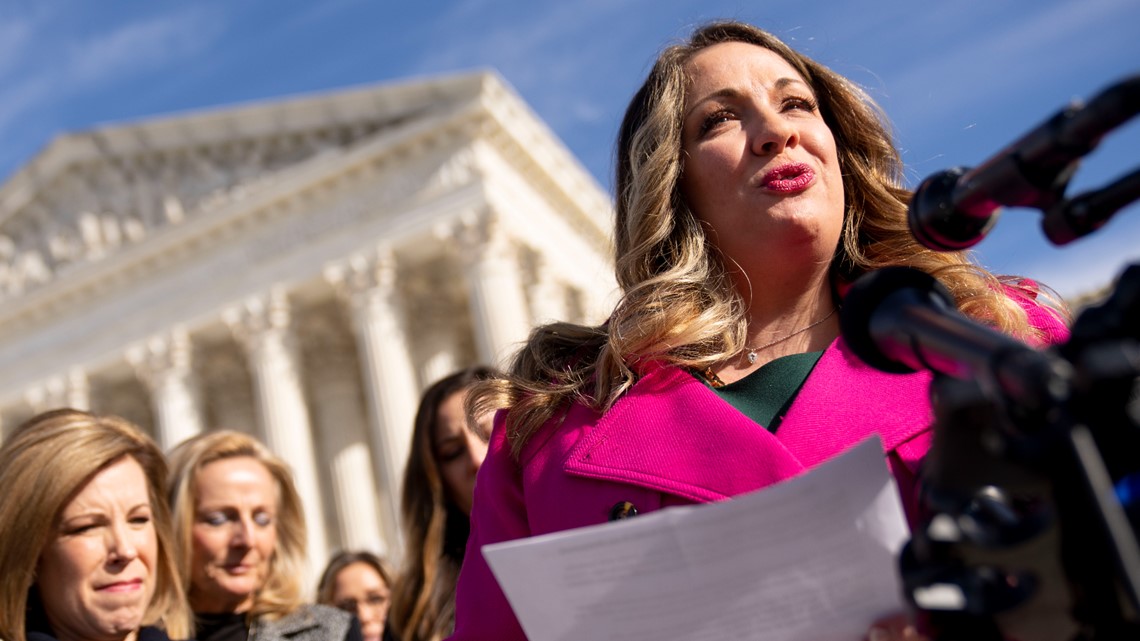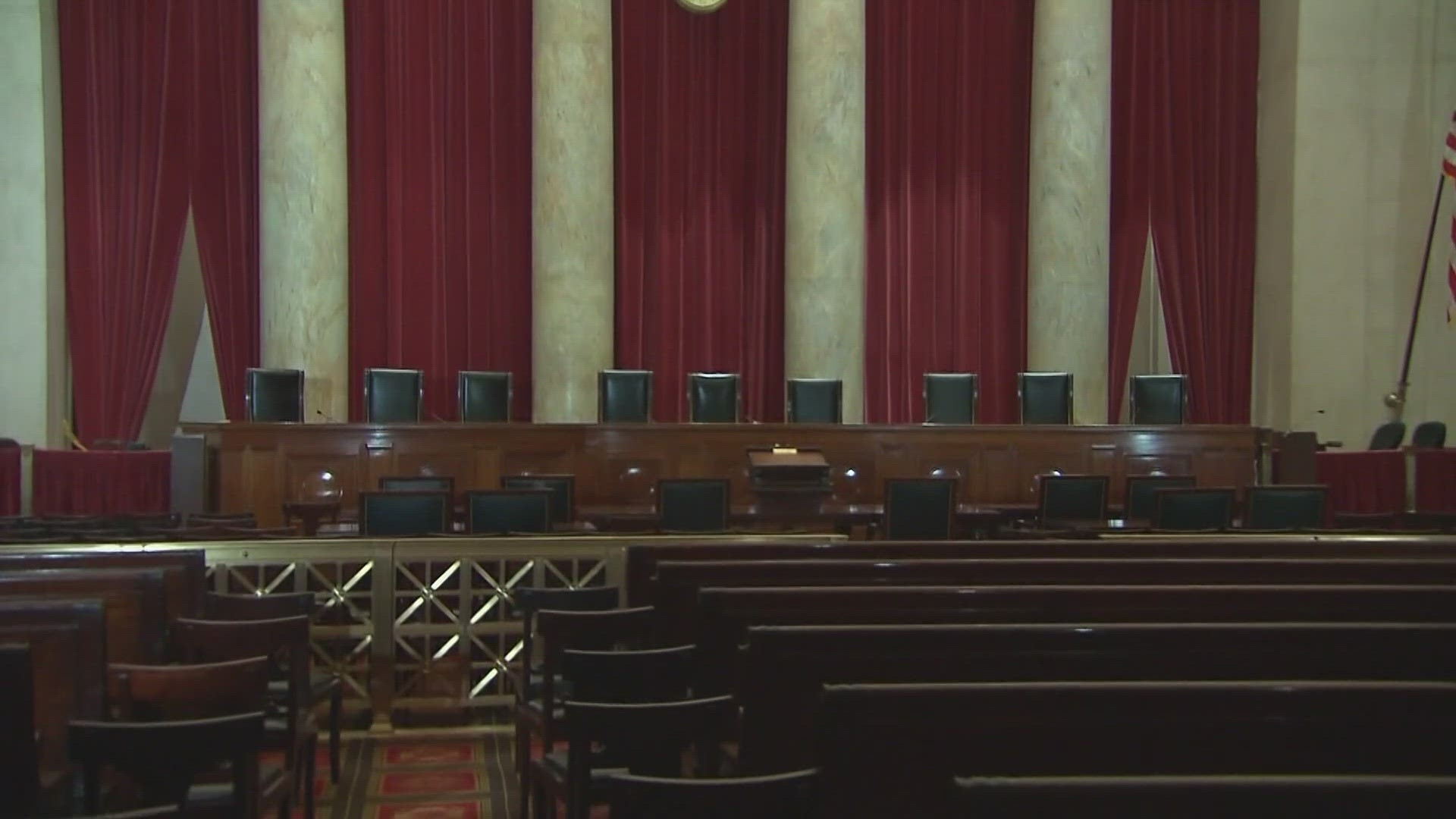WASHINGTON, D.C., USA — Depending on who you ask, Friday's ruling by the U.S. Supreme Court that allows a Denver website designer to refuse to make wedding websites for same-sex couples either protects free speech or encourages discrimination.
The nation's highest court sided with Lorie Smith, who owns 303 Creative, in a 6-3 ruling following a seven-year court battle that began when she received a request to make a wedding website for a same-sex couple.
"In the services that Lorie provides, all of the websites she creates are custom. They are tailored to the couple ... so in every instance she's looking at what the message is, not who's requesting it, and in that sense, she's not able to post any type of sign that would suggest she's categorically denying any type of service," said Smith's attorney, Kim Waggoner, after the ruling. "She doesn't do that. She serves everyone, including those who identify as [LGBTQ]."
Colorado Attorney General Phil Weiser, who argued the case before the Supreme Court, had a different take after the ruling: "When you say 'I will not make websites for same-sex couples,' you are turning away LGBTQ individuals. Period."
Justice Neil Gorsuch wrote for the court’s six conservative justices that the First Amendment “envisions the United States as a rich and complex place where all persons are free to think and speak as they wish, not as the government demands.”
Gorsuch said that the court has long held that “the opportunity to think for ourselves and to express those thoughts freely is among our most cherished liberties and part of what keeps our Republic strong.”


Justice Sonia Sotomayor wrote the dissenting opinion, saying, in part, “Today, the Court, for the first time in its history, grants a business open to the public a constitutional right to refuse to serve members of a protected class." She was joined by the court's two other liberals, Justice Elena Kagan and Justice Ketanji Brown Jackson.
Sotomayor said that the decision's logic “cannot be limited to discrimination on the basis of sexual orientation or gender identity.”
A website designer could refuse to create a wedding website for an interracial couple, a stationer could refuse to sell a birth announcement for a disabled couple, and a large retail store could limit its portrait services to “traditional” families, she wrote.
Colorado, like most other states, has a law forbidding businesses open to the public from discriminating against customers. Colorado said that under its so-called public accommodations law, if Smith offers wedding websites to the public, she must provide them to all customers, regardless of sexual orientation. Businesses that violate the law can be fined, among other things. Smith argued that applying the law to her violates her First Amendment rights.
"It's been a long and difficult seven-year journey," Smith said. "One where I've had to face harassment, constant hacking attempts, and even death threats, but the Supreme Court's ruling today corrects that injustice.
"I'm so very grateful to the United States Supreme Court who affirmed today that Colorado can't force me or anyone to say something we don't believe," she said. "This is a victory for all Americans."


Smith also wanted to post a statement on her website about her beliefs, but that would have run afoul of the Colorado anti-discrimination law.
"Wedding seasons have come and gone, and I look forward to creating consistent with what I believe and what my faith teaches me about marriage," Smith said. "I am excited about taking this next step."
Weiser called the ruling "deeply concerning" and said it is "far out of step with the will of the American people and American values."
He also said the ruling threatens to destabilize the state's public marketplace and encourage all kinds of businesses "to claim a First Amendment free speech right to refuse service to certain customers."
Smith's opponents warned that a win for her would allow a range of businesses to discriminate, refusing to serve Black, Jewish or Muslim customers, interracial or interfaith couples or immigrants.
"This decision is outrageous," said Rex Fuller, CEO of the Center on Colfax. "The court just said it's fine to discriminate against anyone you don't like as long as you use your religion as an excuse. That's astonishing."
Smith and her supporters had said that a ruling against her would force artists — from painters and photographers to writers and musicians — to do work that is against their beliefs.
"Those non-discrimination principles still apply so that no one is denied access to goods and services," Waggoner said. "But everyone has the right to free speech, and that's a win no matter what side you're on.. it protects all of us."
In February 2022, the Supreme Court announced that it would hear Smith's case, 303 Creative v. Elenis, after a 2021 ruling by the U.S. Court of Appeals for the 10th Circuit Court sided against Smith and said the practice was discriminatory.
Smith was represented by the Alliance Defending Freedom (ADF), based out of Arizona. Weiser represented the state during oral arguments before the court in December.
“This case is not about websites or speech — but the ability of all to enter the public marketplace as equals," Weiser said Friday. "Equality and fairness are core Colorado values, and we have protected people in our state from discrimination in public accommodations for more than 100 years. We will work hard to ensure that, within the confines of the court’s opinion, we take action to hold accountable those who engage in unlawful discrimination."
After SCOTUS ruling, how far can businesses go to deny services?
The ADF said in a statement that the Supreme Court "rightly reaffirmed" that the government "can’t force Americans to say things they don’t believe." The statement went on to say that "disagreement isn’t discrimination, and the government can’t mislabel speech as discrimination to censor it."
In a 2-1 ruling in 2021, the Denver-based 10th U.S. Circuit Court of Appeals denied Smith’s attempt to overturn a lower court ruling throwing out her legal challenge. The panel said Colorado had a compelling interest in protecting the “dignity interests” of members of marginalized groups through its law, the Colorado Anti-Discrimination Act.
The law, which prohibits discrimination on the basis of sexual orientation, is the same one at issue in the case of Colorado baker Jack Phillips that was decided in 2018 by the U.S. Supreme Court.
The high court said at the time that the Colorado Civil Rights Commission had acted with anti-religious bias against Phillips after he refused to bake a cake for two men who were getting married. But it did not rule on the larger issue of whether a business can invoke religious objections to refuse service to LGBTQ+ people.
The Associated Press contributed to this report.
SUGGESTED VIDEOS: The Culture Report

